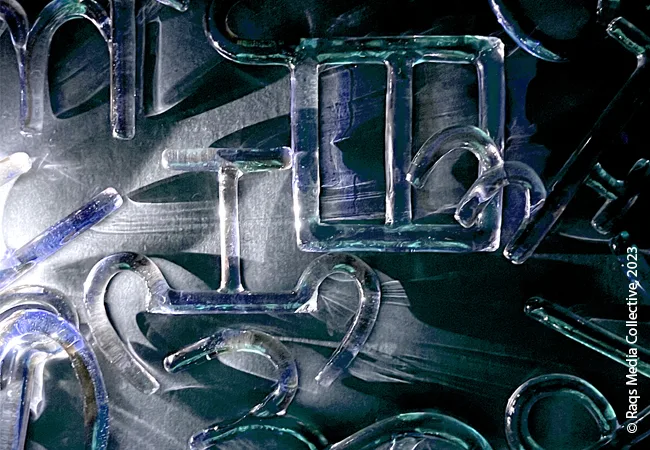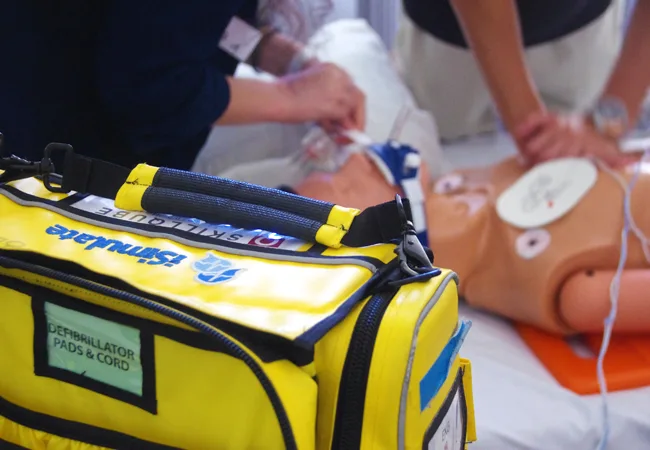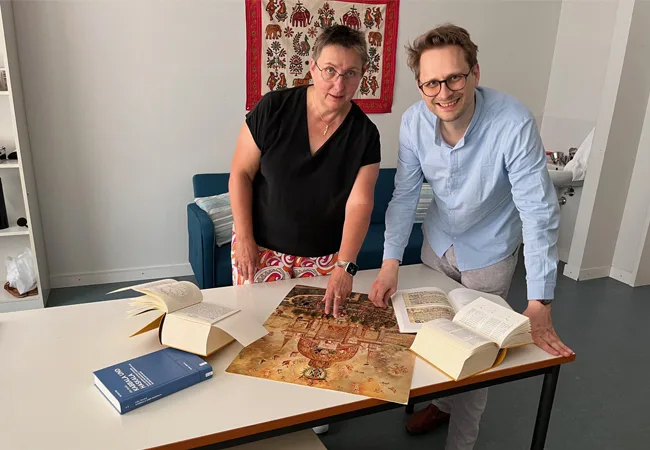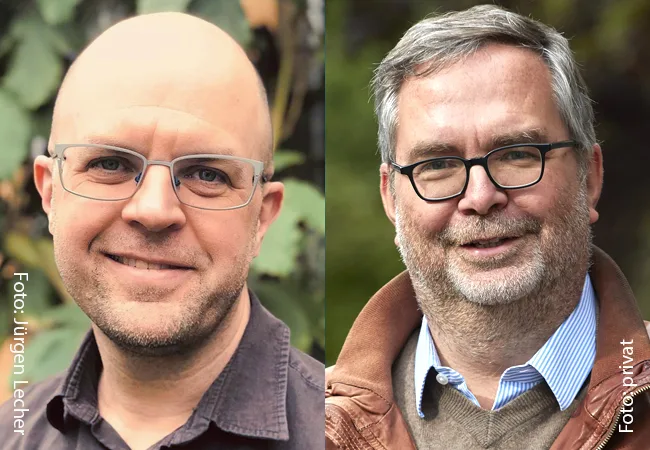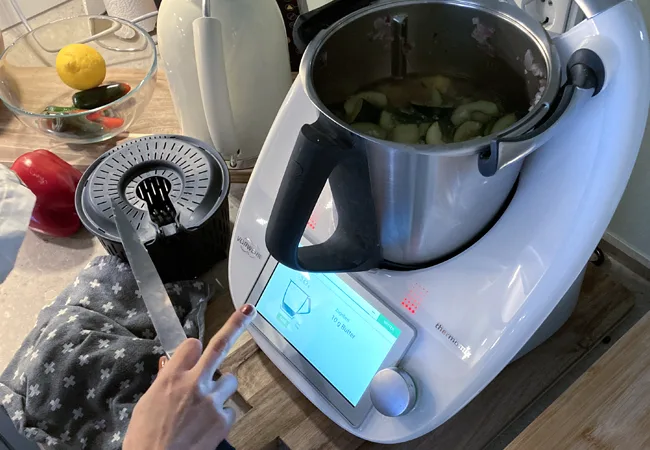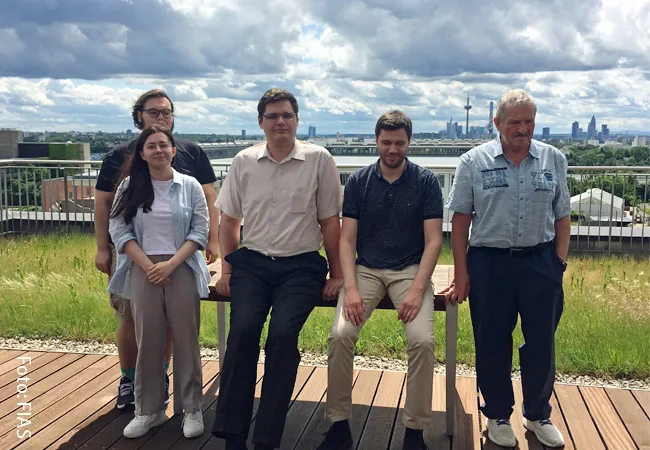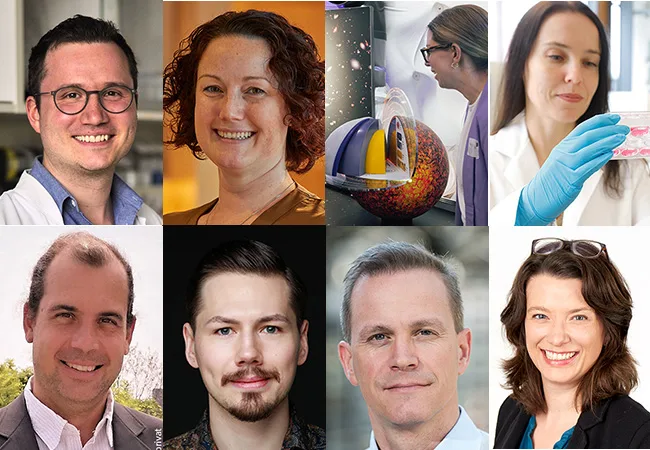With “All, Humans”, the Raqs Media Collective is installing an epistemic video sculpture.
The finishing touches are currently being added to the new building for the Faculty of Linguistics, Cultures and Arts on Westend Campus. The design submitted by Raqs Media Collective, the internationally renowned artists’ collective founded in New Delhi in 1992, came out first in the “Kunst am Bau” [Art in Architecture] competition organized by the federal state of Hesse. The three-part installation entitled “All, Humans” will be officially opened at a ceremony held in the foyer of the new faculty building in the evening of 2 November 2023. Students of the “Curatorial Studies” Master’s program have closely shadowed its progress over the last few months, and will offer insights into the cinematic installation and organize discussions about it, both with the artists themselves as well as other experts.
With their provocative three-part LED video sculpture “All, Humans”, artists Jeebesh Bagchi, Monica Narula and Shuddhabrata Sengupta from Raqs Media Collective are casting a spotlight on the university’s limitations. Looking at the objects for longer might make you hesitate for a moment because the characters used in the artistic work are at first glance incomprehensible to most passersby. They emanate from the West African Mande language Vai, with which even scholars at the institutes of linguistics are not necessarily familiar. This barrier and other elements of the installation point to historical, social and linguistic moments of inclusion and exclusion of people and knowledge in the university context. Who and what are allowed to occupy space within the university’s structure?
Rarely Asked Questions
The three-part installation, consisting of several interconnected video screens on LED modules, is situated in three central building locations. In the entrance area, near the lockers, passersby are invited to pause, look up and experience the university in a new way. The installation located in the library is directed upwards like a projection screen, encouraging viewers to broaden their own perspective. In the foyer close to the lecture hall, a new space to meet, exchange thoughts and ideas and linger for a while is being created under a kind of canopy that covers the material part of the video sculpture. Together, the square LED modules, which are mounted on architectural building elements, produce characters from Vai, one of the Mande languages. Videos playing on the modules show gouache drawings and glass sculptures that represent the words “all human beings”, “equal” and “spirit” in Vai characters. On the other LED panels, the first article of the Universal Declaration of Human Rights runs against a dark background, also in Vai: “‘All human beings’ are born free and ‘equal’ in dignity and rights. They are endowed with reason and conscience and should act towards one another in a ‘spirit’ of brotherhood.” An LED mesh shaped to resemble a canopy is draped like fabric over each of the supporting structures. Illuminated geometric and floral shapes, constantly changing and re-forming, float across the surface.
Typical of Raqs Media Collective’s work process is its sensitive handling of local conditions, contexts and situations: Engaging with the public space remains a constant focus and the starting point for its artistic practice. Time and again, the collective returns to the question of how public space can be used and shaped in a new way. The word “Raqs”, by the way, alludes to the term “Frequently Asked Questions” or “FAQs”, in essence forming its counterpart: “Rarely Asked Questions”. The collective already called into question normative structures of global knowledge production in a decolonial context in past projects and dealt with the extent to which institutions such as museums and universities operate according to Western standards. Forms of knowledge and understanding of non-Western subjects still rarely penetrate the structures of everyday life in these places of knowledge production.
Dismantling the balance of power
Raqs Media Collective’s work is interdisciplinary, involves a wide variety of media and is not limited solely to artistic practice. For example, they curated the exhibition “Hungry for Time. An Invitation to Epistemic Disobedience” (October 9, 2021, to February 27, 2022) at the Picture Gallery of the Academy of Fine Arts Vienna. By adopting an external viewpoint, the collective engaged in a critical confrontation with the institution, seeking possibilities to break down the Eurocentric and primarily male canon of the famous collection. The idea was to restructure the Academy’s historical art collection, taking the current discourse of de-colonialism in art and cultural studies into account. By adding the works of many non-Western artists, the collective highlighted the artistic positions that the Academy had not taken into consideration until then. Raqs Media Collective also mirrored the Western influence on the museum’s structure: Its exhibition took a stand against the usual chronology, where one art period follows another and arranges works of art according to “master” and “pupil”. Instead, through scenes resembling those of a play, they created moments in their presentation where the audience could pause and reflect on the balance of power in the global production of knowledge. Like at the Academy of Fine Arts Vienna, the collective is now once again calling into question habitual knowledge structures in the Western hemisphere with its video sculpture “All, Humans” in the new building of the Faculty of Linguistics, Cultures and Arts.
Familiarizing themselves with a curatorial practice that dismantles fixed structures and encourages critical inquiry is particularly illuminating for the students of the Master’s program “Curatorial Studies – Theory – History – Criticism”. At the inauguration, the students will hold a public debate with the collective. To encourage a dialogue with visitors and building users, the students have compiled a booklet as well as an art education program for “All, Humans” for the 2023/24 winter semester. Guided tours with experts from various disciplines take place once a month. In addition, students offer two tours in plain language and sign language. They also extend invitations to regular meetings under the canopies, known as gatherings, for a debate at eye level. For the 15 students, it is important to communicate not only the medium and content of the three-part installation but also to support activities on campus through new places for encounter and critical discussions.
The art education project is the annual project of the students who started their Master’s program in 2022. Developing and implementing their own project together as a group is part of the curriculum. In the past, the student cohorts curated exhibitions in the fffriedrich project space in collaboration with the museums cooperating with the MA program. This exhibition space is situated in Frankfurt’s city center, not far from the Römer (City Hall), and enables program participants to experiment with curatorial practice. The “Kunst am Bau” commission’s enthusiasm for Raqs Media Collective’s design for the university’s new building project is hardly surprising. The work not only creates a possibility for the institutes and the new building to identify with each other, but also reflects academic life as well as the social and historical responsibility of academia. Instead of conducting research behind closed doors, it calls for the inclusion of knowledge far beyond Eurocentrism.
“Curatorial Studies” students Dalwin Kryeziu and Carolin Tüngler


